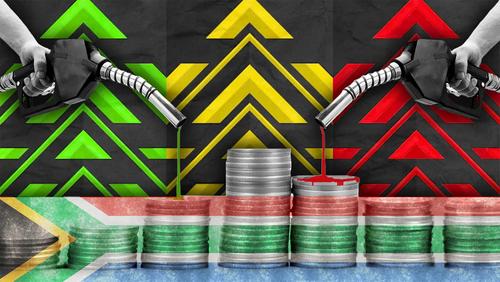411
Rising Oil Prices Threaten Higher Fuel Costs in South Africa

Economists are sounding the alarm over the potential for higher fuel prices in South Africa as the international oil price continues to climb. Brent crude oil exceeded $76 per barrel last week for the first time since October, causing concern about its impact on local fuel costs.
Economists’ Warnings
Chris Harmse, consulting economist at Sequoia Capital Management, emphasized the risks posed by rising oil prices:
“At $77 per barrel, the price is already $7 higher than in October. Combined with the weaker Rand, this could lead to significant fuel price increases.”
Harmse predicts the following increases for February:
- Petrol price: Up by 64 cents per litre
- Diesel price: Up by 70 cents per litre
These increases could drive inflation higher and possibly lead to interest rate hikes, which would place additional financial strain on consumers.
Impact of a Weaker Rand
Johann Els, chief economist at Old Mutual Group, explained that the combination of higher oil prices and a weaker Rand-dollar exchange rate has caused an under-recovery on fuel prices:
“The current status indicates a fuel price increase of around 73 cents per litre, but the final adjustment will depend on developments in the coming weeks.”
Els remains optimistic that oil prices will stabilize within the $70–$76 range throughout 2025. However, he confirmed that a fuel price increase is expected in February.
Historical Context and Predictions
Independent economic analyst, Professor Bonke Dumisa, pointed out the historical parallels:
“We saw similar fuel price increases in the first half of last year, and 2025 could follow the same trend. Prices may rise in the first half and drop in the second.”
Waldo Krugell, economics professor at North-West University, highlighted the causes of the recent spike:
- Increased demand: Cold weather in the northern hemisphere has boosted oil consumption for heating.
- Chinese stimulus: Anticipated economic measures in China could further raise demand.
- Potential supply constraints: Geopolitical tensions, including potential U.S. sanctions on Iran, could limit supply.
Broader Economic Implications
Krugell warned of the ripple effects of higher oil prices:
- Increased fuel prices contribute directly to higher inflation.
- The weaker Rand intensifies upward pressure on fuel costs, exacerbating the impact on South African consumers.
What to Expect in 2025
While global economies remain sluggish, economists predict that oil prices will stay below the critical $80 per barrel mark. However, any fluctuations in the Rand-dollar exchange rate or international geopolitics could alter the outlook.
The combination of rising oil prices and a weaker Rand presents significant challenges for South Africa. With economists forecasting fuel price increases in February, consumers may need to brace for higher transportation and living costs.
Follow Joburg ETC on Facebook, Twitter , TikTok and Instagram
For more News in Johannesburg, visit joburgetc.com















